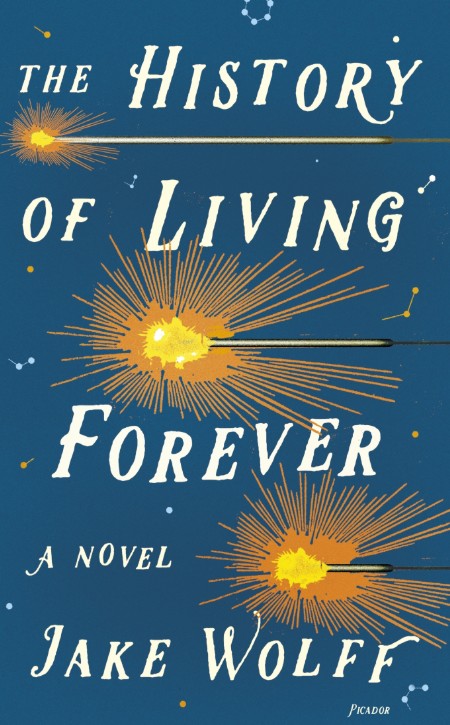Ah, the heady lure of immortality – what is there not to find attractive about the idea of living forever?
Almost nothing if the motivations of the characters in Jake Wolff’s unconventionally plotted race to the immortal finish line, The History of Living Forever is any guide.
In this sometimes flawed but compulsively readable book, the lure is always the chance to beat death at its own game, to fight back against disease and fatal decay using the mysterious and hallowed “elixir of life”, a compound of varying components that at one time or another contains mercury, cocaine, tribal medicines and even some electroshock for good measure.
It is as alluring as something can get and it explains why trouble Sammy Tampari, he of the rich but emotionally disengaged parents, the rarely happy psyche and the (literally) mercurial sense of self, is pursuing it with such singleminded passion, to the exclusion of everything, and everyone, else.
His is a spectacularly selfish world dominated by one thing and one thing – to make himself happy, to erase the sadness and pain that has dogged him all his life since a debilitating childhood trauma that no one seems to take seriously (but him) and to feel and be normal.
“To brace myself against the questions and condolences to come, I let my mind drift to Sammy’s elixir. P. cupana was the one thing that contained even an ounce of familiarity. I’d seen him hold it, test it, administer it to a sick patient. To understand his elixir, I would need to understand the recipe in relation to the life he’d been living. The recipe book was a code, and his journals were the method to break it.
‘How sad,’ Dana was saying. ‘What a sad thing.’
Emmett poured himself more soda. ‘The whole day was weird. Like a fake day.’
My aunt put a comforting hand on my arm, and I managed to smile vaguely in the direction of that hand. Already I felt closer to Sammy, as if I were tugging back on the rope he’d used to descend into whatever depths had claimed him.” (PP. 66-67)
When we meet Sammy, he is a chemist and alchemist just entering his thirties who has taken a job at a high school in Winterville, Maine teaching chemistry where science prodigy sixteen-year-old Conrad Aybinder, who has borne more than his share of pain of loss, his mother dying when he was a kid and his father subsequently sliding into alcoholism, is instantly attracted to his intensely emotive and wholly unpredictable style of teaching.
They become much more than just teacher and student over time, but when Sammy is found dead in his car of a suspected drug overdose, Conrad discovers there was a great deal that he didn’t know about his first love, whose love was as cruel and inappropriate as it was sweet and tender.
Through a box of Sammy’s journals that get delivered to him, Conrad discovers his former teacher/lover’s great quest for the “elixir of life”, an all-consuming driving imperative which saw off countless lovers – Conrad was the last in a long line of people including Catherine and the mysterious Sadiq – any sense of existential stability or normalcy.
All Sammy wanted to do is save himself but Conrad is seized by the idea that he could save his dying alcoholic father and possibly even his best friend RJ’s younger sister who has muscular dystrophy, and this drives him to try to solve the mystery of Sammy’s cryptic “recipes”, all of which come with the promise of life everlasting if the final part of the puzzle can be solved.
In his own way, Conrad becomes weirdly obsessed, alienating his cousin Emmet with whom he lives, along with his endlessly supportive Aunt Dana, all to save the person he loves but with whom he has an estranged and broken relationship.
Is it worth going as far as he does to save him?
That is the great burning question of The History of Living Forever which packs an enormous amount into its tightly-written 360 pages or so, almost to the point of breaking what is a very clever premise and a deft and highly-skilled execution.
There is no doubt that Jake Wolff can write and write dazzlingly well; The History of Living Forever is a thing of great prosaic beauty, possessing a poetic sense that seduces you on every brilliantly written page.
However, while the writing is superlative and the characters vividly drawn and fully realised, there is a sense of far too much being pushed into the book’s pages, to the point where any emotional connection to the story is largely squeezed to the sidelines.
There is so much loss and trauma in everyone’s lives, so much cruel and terrible things unleashed ion them, especially Sammy and Conrad, that you almost cease to care about anything that is happening, such is the tumult and tsunami-like proportions of the overwhelming sadness that stalks them.
Conrad does have some laudable and uplifting elements to his life – Dana is devoted in the healthiest of parental ways, Emmett is a caring cousin and Conrad’s husband (the book covers a fair number of years, centuries in fact, in its fanciful but deeply human narrative) is the soulmate of his dreams – but by and large, he is defined by loss and grief, at least when he is sixteen which consumes much of the book, and it becomes so much to handle that you find yourself somewhat switching off from the emotional impact which is damn near relentless.
“Sammy wrote that people see the elixir of life as against the laws of nature—to wish for it is amoral, to search for it is hubris. But I have wished for it, and I have searched for it, and here’s the closest I have come to a revelation: In hindsight, searching for Sammy’s elixir felt no different than searching for a job, for a boyfriend, for a house that’s big enough (but small enough) to call home. It’s just another thing I’ve wanted, among many other things, at some point in my life.” (P. 357)
Having said that, what makes The History of Living Forever such a brilliant read is the sheer level of imagination brought to bear and Wolff’s innate understanding of and evocation of what makes us human.
We are irrational, driven by emotions, condemning of maturity and logicality, thoughtfulness and care if it doesn’t suit our purposes, and prone to destroying things even as we try to save them and Wolff captures all the hurtful if hopeful contrariness in his book which, though it overworks itself, is brimming with a desperate, frantic humanity.
The History of Living Forever is proof positive that, selfishly or not, we are dreamers and hopers, risk takers and lovers, people who will do what it takes to save the ones we love but who do not always know exactly when to hit “stop” and admit that whatever we are doing to the exclusion of all else, may be doing more harm than good.
In the end, for all its busy flaws and emotional alienation, The History of Living Forever is an impressive book, one possessing elegant but evocative writing, a fecund imagination that reinterprets all kinds of things through the lens of love-driven desperation and a palpable sense of of humanity, love, grief and loss that reminds us again and again that even the very best of things can become tainted if we don’t keep some sense of perspective and realise that though we are consumed now by something, it may not always be the thing we need or crave and that we should always remember the world is bigger and better than us and possessed of so many things that one day we might in fact find what we are looking for and it is nothing like what we thought we needed.

